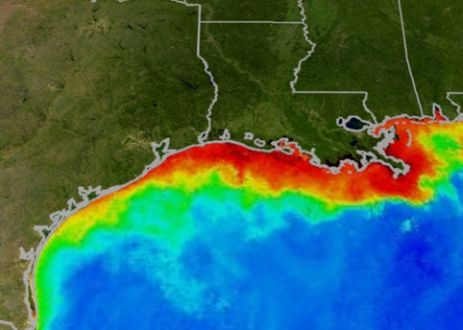Satellite view of the Gulf. In the red areas, a vast, nitrogen-fed algae bloom has risen, blotting out most sea life underneath. NASA-NOAH image
To understand our impact on nature, there is truth in the saying, “everything is connected.” Few situations illustrate this concept as dramatically as the agricultural wastes from the Midwest that contribute so seriously to the aquatic dead zone in the Gulf of Mexico.
Human activities and natural phenomena occurring on land masses combine to impact air quality and small-scale climate systems. Wastes and sediments flowing off lands affect natural concentrations of nutrients in water and the health of aquatic habitats. Gases suspended in air dissolve into sea water and disrupt the normal chemistry of oceans.
These releases, often invisible where the problems originate, can have repercussions in other states or nations through natural systems that are not at all limited by political boundaries. Time and distance too often obscure the impacts, hiding unintended or unknown connections with downstream costs.
Take the example of crops growing hundreds of miles inland in the “... Read more
